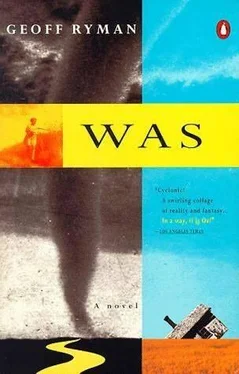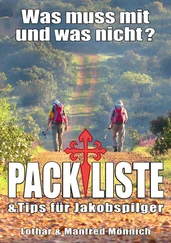Aunty Em rose up, arms outstretched, her head shaking from side to side.
"The Spirit, the Spirit's on her!" called Harriet.
The old man with the beard grabbed her arms. Harriet stroked her brow.
"Brrrrrrrrrrrrrrrrrr!" said Aunty-Em, her tongue rattling loose in her mouth. Her hands shook; her lined cheeks flapped loosely.
Dorothy wailed in terror. "Oh!" she cried, the shadow of the terror of Lawrence still on her.
"Bulor ep ep ahhh no up shelopa no no no shelopa apa apa no ma!" cried Aunty Em.
"Oh, the Spirit's strong, the Spirit's good!" said Harriet, wrestling.
"I've never seen it like this," said the old man, looking worried.
Then the train came, with a whiplash whine along the metal rails nearby and a piercing shriek of steam through a whistle. A bell began to clang over and over. The horses in the corral whinnied and snorted.
And Dorothy remembered. The train had come once before and taken her away and shown her a world full of reasonable people who did not love her. The train came closer with a sound of steam and smoke, and Dorothy saw her aunty tossing her head back and forth, held down by other people, back and forth as if saying no, no, no. Aunty Em wanted to be hauled away from this world, from the farm, from the past. Dorothy was suddenly afraid.
"Don't die, Aunty Em! Don't die!" Dorothy shouted. The shadow of the train was cast on the white canvas.
The skinny woman leaned down, all pine-tree smells, breathing into Dorothy's face. "Your aunty's not going to die, darling," she said. Dorothy clung to her aunty's dress.
The Preacher had stopped preaching. He fought his way through the other people. Dismayed, he knelt down to look at Aunty Em.
"If you gentlemen could help me carry her outside," he said.
"You shouldn't have stopped, Preacher," chuckled Harriet. "It's what she came for."
The men carried Aunty Em out to her wagon. The train was far down the track, leaving a slight haze over the field.
Broke it up as soon as it got going, said voices, complaining. Dorothy followed, a fist rubbing her eyes to make the point that she was unhappy too.
"It's all right, darling, this means your aunty is with Jesus."
"Will she want to come back?" Dorothy asked.
The old man lifted Dorothy up into the wagon. Aunty Em was looking at her dimly. "Hello, Dorothy," she said gently, warm and soft and kind and far away.
"Oh, Aunty Em," said Dorothy, and lay down on the rough boards. "Oh, Aunty Em. I love you, love you, love you, love you."
"Why, child!" chuckled Aunty Em, pleased. She hugged Dorothy and kissed the top of her head.
"I thought you were going to die!" the child said.
"Oh, no," said Aunty Em, recalling the impact of Christ's love. "Not die."
A dog tied to a wagon began to bark. Dorothy looked up. "Toto?" she asked.
Aunty Em's hand, stroking her hair, froze.
Toto had lived throughout the winter in the buffalo wallows. The wallows had frozen hard, and the marsh reeds heavy with ice had fallen against each other to make ice shelters.
All through that winter, Toto would appear as if from nowhere, barking as he ran out of freezing mist that blazed with sunlight. He would bring Dorothy sticks to throw for him. They sparkled with frost. He bounded across crisp frosty ground to bring them back and drop them again at Dorothy's feet.
When blizzards fell, making a low grinding sound as if the sky were being milled, Toto would bark as Dorothy passed the barn. She would find him in the hay, and he would whimper and lick her hands. Dorothy left him food in a broken bowl and would return each morning to find it clean.
Aunty Em's hens began to disappear. "It's that dog. He's gone wild!" Aunty Em exclaimed. Toto unnerved her.
She would find him in her own yard, crouched and snarling at her, baring his fangs. When Aunty Em tried to grab him, he would scamper just out of reach and growl at her again.
"Dorothy! Dorothy! Come and call your dog!" Aunty Em would demand.
In the spring, the thaws began. Dorothy started school. She would walk every morning along the lane, between the ruts filled with muddy water and crusted with patches of ice. Toto would come out of the wallows from under the open arms of the scarecrows to meet Dorothy. He would be filthy, blinking and covered in mud. Dorothy would chuckle, and kneel down. "You got that old lady real mad at you."
He started to bring her presents. He brought her the Jewells' chickens, murdered and whole.
"Dorothy, you must control that dog. The Jewells are good neighbors to us and they can't afford to lose their livestock any more than we can. Now the next time you see him, you have a rope with you and you catch him and bring him back."
"Yes, Ma'am," said Dorothy. She somehow always forgot the rope.
Dorothy wanted to be good. That was why she worked so hard at her chores and her school exercises. She could sense goodness within her, like a pouch in her breast, to be opened. She wanted to love her aunty; it would be good to love her aunty. She loved Toto.
Toto was not good. He dug up the green shoots in Uncle Henry's fields. He tore down the washing from the clothesline into the mud. Once in the lane, he bit through the sleeve of Dorothy's only coat and tried to drag her with him, away.
"We can't go back, Toto," she said, stroking the rough gray hair of his terrier head.
She began to see him less and less. Sometimes he disappeared for days at a time.
Then one day, in late afternoon, Dorothy walked back from school hugging her books, head down. Aunty Em was at the stove, slamming pots, loud as she could.
"Good day, Dorothy?"
"Yes, Ma'am."
"What did you study, child?"
"Sub… subtraction."
"Hmmm."
They heard a bark.
"That dog. Back again."
Aunty Em wiped her hands on her apron and opened the door.
The earth was soft, muddy, thawed. It was about four-thirty in the afternoon in late March, what had been a nice day, a sunset blur of orange and blue across a flat and featureless sky. Toto the dog sat waiting.
"We'll have to try to catch him," said Aunty Em. She swept her coat on in one motion and put on gloves and took a rope. Dorothy followed, not wanting Toto hurt.
They opened the door again, and Toto had not run away. He was still there, at the end of the yard, waiting beside one of Aunty Em's dead flowerbeds. He barked as if to say: Here.
"What's he brought with him this time?" said Aunty Em, striding.
He had dug something up. He waited over it, eyes fixed on Aunty Em.
Aunty Em suddenly gave a kind of coughing, stricken cry. Her hand went to her throat, and she dropped the rope. Dorothy knew then that Toto had done something terrible.
Aunty Em broke into a run. "Horrible, horrible animal! Horrible, horrible dog!" she said, sounding as if she were coughing. She ran toward him, trying to pick up a handful of mud, to throw at him. She slipped onto her knees and kept sliding toward the thing from out of the ground.
"Rob Roy," cried Aunty Em, sobbing. "Oh, Robbie! Rob Roy!"
Toto barked at her, just out of reach. He ran around her, bouncing furiously.
Toto had dug up the corpse of another dog. Dorothy walked up next to her aunt and stood watching.
"Toto, stop," she said weakly.
There was bone with some wet and bedraggled fur still clinging to it, and hollow eyes, and a doggy smile full of teeth, a large skeleton with some skin still attached, a long, big corpse of a huge long-haired animal.
Aunty Em knelt in the mud, sobbing, covering her face.
Raf raf, raf raf, said Toto. He came hopping toward Emma. He was small and fierce and full of hate. You see, you see? Toto seemed to say. You had one too.
"Toto. Leave her alone," whispered Dorothy.
Aunty Em spun around and grabbed Dorothy and shook her, thick spittle clogging her lips, gray eyes wild. "Look at it! Look at it!" she demanded. "See it? See it? That's death. That's what your mother looks like now, in the ground."
Читать дальше












